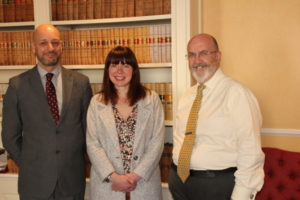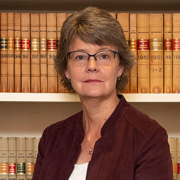
Steve Bell, Helen Appleby-Mitchell and Richard Nelson
Hexham Solicitors Nicholson Portnell are delighted to announce the recruitment of new members to their busy conveyancing and Private Client teams.
Although steeped in farming thanks to his upbringing on a Devon Farm, Steve Bell took the opportunity on leaving school to enter the legal profession, initially in a clerical and later IT capacity. This sparked a lifelong interest in the law, which Steve pursued by initially qualifying as a legal executive. This led to further academic qualifications and ultimately to his qualifying as a solicitor in 2006.
Pursuing his career with four firms in his native Devon, Steve initially dealt with both Conveyancing and Private Client matters before eventually opting to specialise in Private Client work.
Changing family circumstances led Steve and his wife Tracy to make the decision to relocate to the North East. Explaining the decision to move the entire length of the country, Steve says that he and Tracy have been in the habit of visiting the North East for a number of years, eventually leading to their decision that it was the place for them to settle.
Since making his move north, Steve has been filling his spare time with exploring his new surroundings and especially in walking the beaches in Northumberland coast.
His move north also made it somewhat easier for Steve to pursue one of his other interests in life namely following Leeds United Football Club. Asked how he came to follow this particular team, Steve attributes it to his elder brother, who was a dedicated fan in the Leeds heyday of 1970s, and who passed on his love of the club to younger brother Steve.
Steve’s involvement in football has not been limited to spectating, having been a speedy winger in his youth. Indeed, speed seems to be something of a common thread in Steve’s sporting interests, as he is a been motorcyclist and Formula 1 fan, and has even, on occasion, raced Formula Ford in his time.
Nicholson Portnell’s second recruitment of the spring actually sees the return of a familiar face in Helen Appleby-Mitchell. Originally from Gateshead, Helen was with Nicholson Portnell from 2014 until 2016, having previously attended the university of Hertfordshire and trained as a solicitor in Milton Keynes.
Following her initial spell with Nicholson Portnell, Helen worked as a solicitor with firms in the Chester le Street and Gateshead areas, before taking a career break to become a mum to daughter Robyn and son Joe. Having become a mum, Helen wanted to adjust her work-life balance, and Nicholson Portnell, with its family-orientated flexible working patterns, seemed the ideal place to restart her career.
As a busy working mum, Helen’s spare time is limited, but she invests much of it in music. A multi-instrumentalist in her youth, Helen now concentrates on singing in a Rock Choir. Although Helen’s choir is based in Chester le Street, Rock Choir is a national organisation, which occasionally sees several local branch choirs linking up into national mega choir.
Not content with this, Helen is also a keen runner, currently returning to the “Couch to 5K” fitness programme. She has completed several marathons in the past and is now working up to that level once again.
Welcoming Steve and Helen to the firm, partner Richard Nelson said that he was delighted that the firm had acquired 2 experienced practitioners who both fully subscribed to the firms ethos of providing a professional yet personal service.
Both Helen and Steve look forward to meeting clients and being of service to them in the years to come.





